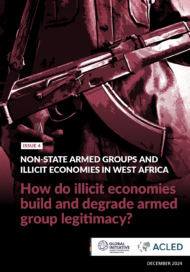Posted on 16 May 2017
Abajo en español.
Organised crime has emerged as a major factor that exacerbates violent conflict and state fragility. It also has a significant destabilizing impact on peacebuilding and statebuilding. As was pointed out in the opening paragraph of the UK Building Stability Overseas Strategy (BSOS) paper, “when violent conflict breaks out, the costs to the country and the international community are enormous. Lives are lost, people displaced, trade links cut, and organised crime groups or terrorists are given an opportunity to take root, exacerbating instability.”
Criminal networks and activities fuel violent conflict, finance terrorists and militias, and complicate conflict resolution and post-conflict reconstruction. Illicit networks span continents, yet they often thrive in conflict-affected and post-conflict states by taking advantage of illicit opportunities to entrench their economic, political and social influence through corruption, rent-seeking, predation and criminal governance. The reality is that the threat from external actors such as transnational armed groups and organised crime gangs is increasing. This fact, is also evident in the fourfold increase in the number of United Nations Security Council resolutions and statements that contain references to organised crime over the past decade.
Notwithstanding increasing levels of concern among national governments and international organisations with respect to the links between organised crime and conflict, much remains to be understood about the nature, extent and implications of the connectivity between the two. Analytical capacities within governments and institutions such as the United Nations are weak or insufficiently tailored to deliver multi-dimensional integrated responses. Operational tools are often inadequate, siloed, and there is an insufficient understanding of what works and what doesn’t to reduce the growing impact of organised crime on conflict. This gap, at a time when the demand for multinational (often UN-led) peace operations is at an all-time high, poses significant risks for the effectiveness of what has become the ‘world’s go-to tool’ to manage crises and prevent violence.
The Global Initiative was pleased to contribute to a collaborative research series on the Crime-Conflict Nexus coordinated by the United Nations University Centre for Policy Research (UNU-CPR) funded by UK aid from the UK government. This series developed case study and thematic papers to answer three key questions:
Understanding the impact of global illicit flows on local conflict dynamics:
- Centrifugal Forces: Exploring the nexus of global illicit flows and local conflict dynamics – Mark Shaw and Tuesday Reitano, Global Initiative against Transnational Organised Crime
- Libya: a patchwork state sewn together along trafficking lines – Tuesday Reitano and Mark Shaw, Global Initiative against Transnational Organised Crime
- Conflict obscuring criminality in Nigeria – Sasha Jesperson, RUSI
Determining when criminal agendas undermine peace and when these actors can be motivated to support it:
- Going straight: Criminal Spoilers, Gang Truces and Negotiated Transitions to Lawful Order, James Cockayne, John de Boer & Louise Bosetti, UNU
- Criminal Agendas and Peace Negotiations: The Case of Colombia, John de Boer, Juan Carlos Garzón-Vergara & Louise Bosetti, UNU
- Crime, Conflict, and Regime Transitions: Colombia, Nigeria, and Myanmar, John de Boer, Sasha Jesperson & Vanda Felbab-Brown
Developing strategies to prevent and limit the growth of political-criminal alliances in post-conflict settings:
- The Hellish Road to Good Intentions: How to Break Political-Criminal Alliances in Contexts of Transition, Vanda Felbab-Brown, Brookings
- Afghanistan Affectations: How to Break Political-Criminal Alliances in Contexts of Transition, Vanda Felbab-Brown, Brookings
- Myanmar Maneuvers: How to Break Political-Criminal Alliances in Contexts of Transition, Vanda Felbab-Brown, Brookings



